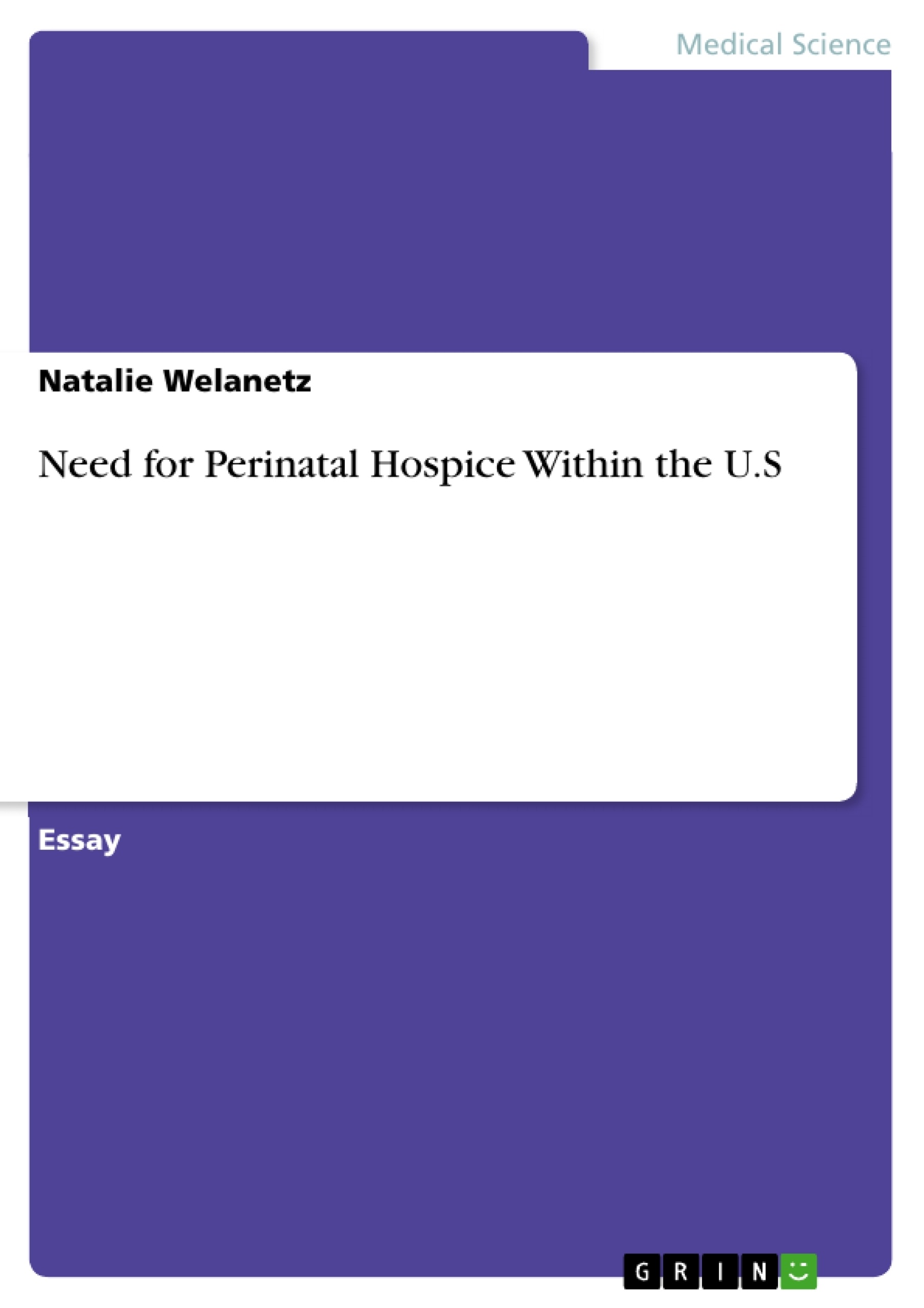Infant loss and neonatal death is a common, yet very taboo subject in the United States today. Our society wants to promote the “happy” birth outcomes while sweeping negative outcomes under the rug, to be forgotten, hushed, moved on from quickly. Perinatal palliative and hospice care provides families with options to honor the life of their lost babies. More organizations should implement these programs throughout our country.
Inhaltsverzeichnis (Table of Contents)
- Within the U.S
- Perinatal Hospice
- History of Perinatal Hospice
- Statistics of Infant Death
- Perinatal Hospice Care Settings
- How Does This Affect Me?
- Growth of Perinatal Hospice Programs
- Implementation of Perinatal Hospice Programs
- The Madigan Army Medical Center
- Opposing Viewpoints
- Future of Perinatal Hospice Programs
- Personalized Care Plans
- Peace of Mind
- Need for Perinatal Hospice Programs
Zielsetzung und Themenschwerpunkte (Objectives and Key Themes)
This document argues for the widespread implementation of perinatal palliative care and hospice programs throughout the United States. It aims to raise awareness of the need for such programs and to highlight the benefits they offer to families facing the loss of a child during pregnancy or shortly after birth.
- The importance of perinatal palliative care and hospice programs in supporting families facing the loss of a child.
- The unique challenges faced by families experiencing pregnancy loss, infant death, and perinatal complications.
- The benefits of perinatal hospice programs for families, including providing options, empowering families, and offering a dignified ending to a short life.
- The need for greater awareness and support for perinatal hospice programs in the United States.
- The potential for perinatal hospice programs to improve the lives of families and to create a more compassionate healthcare system.
Zusammenfassung der Kapitel (Chapter Summaries)
- The document begins by introducing the concept of perinatal hospice and its importance for families experiencing the loss of a child during pregnancy or shortly after birth. It highlights the lack of widespread availability of such programs in the United States and argues for their implementation in every state.
- The document then delves into the history of perinatal hospice, tracing its roots back to the development of adult hospice care in Great Britain. It explains how the advances in prenatal screening have led to an increase in the number of families receiving fatal diagnoses during pregnancy.
- The document provides statistics on infant death rates in the United States, illustrating the need for perinatal hospice programs. It also discusses the various settings in which perinatal hospice care can be provided, including hospitals, birth clinics, hospice facilities, and the family's home.
- The document explores the impact of perinatal hospice programs on families, emphasizing the support and options they provide. It highlights the emotional and practical challenges faced by families experiencing pregnancy loss and how perinatal hospice programs can help them cope with grief, make memories, and plan for the future.
- The document discusses the growth of perinatal hospice programs in the United States, noting the increase in the number of hospitals offering such services. It also addresses opposing viewpoints regarding perinatal hospice, including concerns about the potential for increased grief and the ethical implications of providing care to a fetus.
- The document concludes by outlining the future of perinatal hospice programs and the potential for national initiatives. It emphasizes the benefits of these programs for families and calls for greater support and awareness in the United States.
Schlüsselwörter (Keywords)
The main keywords and focus topics of the text include perinatal hospice, palliative care, pregnancy loss, infant death, perinatal complications, family support, grief, bereavement, end-of-life care, healthcare system, and national initiatives.
Frequently Asked Questions
What is perinatal hospice care?
Perinatal hospice provides palliative care and support for families who receive a life-limiting diagnosis for their baby during pregnancy or shortly after birth.
Why is there a need for more perinatal hospice programs in the US?
Infant loss is often a taboo subject. These programs offer families a dignified way to honor their baby's short life and provide much-needed emotional and practical support.
What are the benefits of a personalized care plan in perinatal hospice?
Personalized plans empower families to make choices about their baby's care, create memories, and plan for the end-of-life process in a way that provides peace of mind.
Where can perinatal hospice care be provided?
Care can be delivered in various settings, including hospitals, birth clinics, specialized hospice facilities, or even within the family's own home.
What is the history of perinatal hospice?
It is rooted in the adult hospice movement from Great Britain. Advances in prenatal screening have increased the demand for these specialized services as more fatal diagnoses are made early.
Does perinatal hospice increase the grief of the parents?
While some worry about increased emotional burden, the text argues that these programs actually help families cope with grief by providing options and compassionate care.
- Citar trabajo
- Natalie Welanetz (Autor), 2015, Need for Perinatal Hospice Within the U.S, Múnich, GRIN Verlag, https://www.grin.com/document/304702



